Although, now perhaps ‘old news’ to those of us living and working
in Mikindani we couldn’t let this event pass unreported. Last
November The Old Boma’s reputation had had yet another shot in the
arm! The District Commissioner invited us to prepare lunch for the
Tanzanian Prime Minister and 30 of his party; approaching election
time he was going to be making an official visit to Mtwara Region
for 2 days. However it was not to be held at the Boma but at a
Primary School in the remote village of Hinju some 50 km inland
from here. The village is so remote that there are no facilities at
all – no power, limited water and we would have to take absolutely
everything with us. Initially they thought we would donate the
entire cost! However, when I explained that we are a charity they
agreed to give us a ‘donation’ to the cause which did just about
cover the cost of the food.
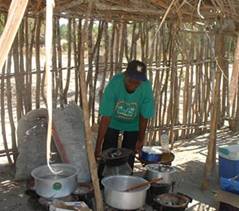 Friday – the shopping trip
to Mtwara took 5 hours whilst Esther searched all over town for
enough chickens to feed this crowd whilst the goat in question was
tethered outside the Boma bleating for a few hours. Saturday –
kitchen a hive of activity chopping, cutting, marinating and
counting bottles of water, soft drinks, plates, glasses, knives,
forks etc. Last minute panic appeared non-existent – my own
memories of the night before a major event of this importance were
very different!
Friday – the shopping trip
to Mtwara took 5 hours whilst Esther searched all over town for
enough chickens to feed this crowd whilst the goat in question was
tethered outside the Boma bleating for a few hours. Saturday –
kitchen a hive of activity chopping, cutting, marinating and
counting bottles of water, soft drinks, plates, glasses, knives,
forks etc. Last minute panic appeared non-existent – my own
memories of the night before a major event of this importance were
very different!
It was a very early start on the Sunday morning – but the
excitement was tangible! On the unmade country roads there was no
sign of a police or security presence -the only suggestion that the
PM might be in danger was the Prime Minister’s Waiter hovering
around ‘tasting’ the food whilst we were preparing it – he must
have approved because he kept coming back for more!
We had originally been told that lunch would be at 2.00pm – then
they changed that to 12.30 – as it happened the official party
turned up at 2.15! But there was a lot of ‘on site’ preparation so
several hours were required. We were given the headmaster’s office
for preparation (including the barbecue – his office will never
smell quite the same!) and the classroom next door was turned into
a dinning room. The rest of the food preparation and the cooking
was done in the open air on the other side of the school!
In the ‘dining room’ tables were arranged around the edge of the
room in a ‘U’ formation and white sheets were used as table
clothes. With the new Boma china, some hastily created green &
black batik it all looked very elegant or at least as elegant as it
could be in a classroom with concrete walls, a corrugated iron roof
and a huge old blackboard on the wall!
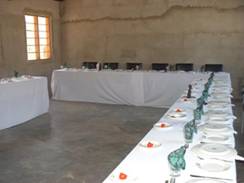 The official party arrived in a flurry of dust as about 40 cars
swept into the school ground. In the background was the celebratory
sound of drums and chanting, and there were dancers that we could
hear but not see from our corner of the school ground. Because they
were so late we abandoned all attempts at ‘silver service’ and put
a couple of desks in the centre of the room as a buffet and allowed
them to help themselves. We were advised to do this so that we
could not be held responsible for delaying them and influencing how
long they took to eat!
The official party arrived in a flurry of dust as about 40 cars
swept into the school ground. In the background was the celebratory
sound of drums and chanting, and there were dancers that we could
hear but not see from our corner of the school ground. Because they
were so late we abandoned all attempts at ‘silver service’ and put
a couple of desks in the centre of the room as a buffet and allowed
them to help themselves. We were advised to do this so that we
could not be held responsible for delaying them and influencing how
long they took to eat!
The menu
Roast Goat (marinated with ginger and then cooked on the BBQ)
Marinated Chicken (with garlic and lemon, also cooked on the
BBQ)
Beef Curry
Vegetable Curry
Pilau rice / Plain rice / Ugali / Salad
Fresh fruit – (as the PM does not eat any fruit that is already cut
– it was just bananas!)
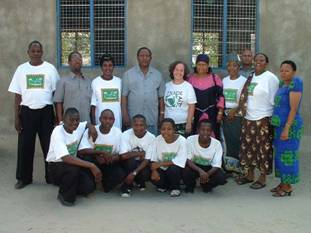 After they had eaten the
District Commissioner invited the whole Boma team into the room,
introduced us and gave a short speech of thanks for providing such
a wonderful lunch. He acknowledged that the Boma is run by Trade
Aid and proceeded to thank Trade Aid for providing this opportunity
for employment and the development of tourism in the Mtwara Region.
The Prime Minister's photographer recorded the event and held a
photo shoot taking a number of pictures on the Trade Aid digital
camera.
After they had eaten the
District Commissioner invited the whole Boma team into the room,
introduced us and gave a short speech of thanks for providing such
a wonderful lunch. He acknowledged that the Boma is run by Trade
Aid and proceeded to thank Trade Aid for providing this opportunity
for employment and the development of tourism in the Mtwara Region.
The Prime Minister's photographer recorded the event and held a
photo shoot taking a number of pictures on the Trade Aid digital
camera.
Once all the clearing up and packing up was complete we set off
back to Mikindani. ‘Tired but happy’ is a phrase that comes to
mind! PS - all the Boma China that went to Hinju came back
intact! Well done! to the team once again.
The summer is soon here and that reminds us of our romantic
honeymoon we had last summer. We want to share our memories with
you.
We got married last summer outside Brighton, UK, after 10 years
together and we had a fantastic wedding with all our friends, 110
persons. On our honeymoon we wanted to start with relaxing on the
countryside and then some city life. We choose Sweden and
Stockholm, not far from London, and with fast direct access.
And we found a tour operator, Peace and Quiet Travel,
offering what we were looking for. Three nights in the
beautiful Mälar Valley and two nights in Stockholm! The week after
our wedding we were on our way.
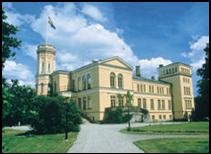 After picking up
our rental car at the airport and after some looking on the map we
found Surahammar Manor. A fantastic place in the Mälar Valley with
romantic surroundings! And such a family atmosphere! The owners
themselves welcomed us and we got a high standard room facing the
parkland. All rooms are individually decorated with elegant
antique furniture. And we really enjoyed the welcome dinner with
Swedish schnapps. In the evening we went early to bed, talked about
our wedding and revelled in that pleasant tired feeling in your
body and serenity in your heart that only a great day can
bring!
After picking up
our rental car at the airport and after some looking on the map we
found Surahammar Manor. A fantastic place in the Mälar Valley with
romantic surroundings! And such a family atmosphere! The owners
themselves welcomed us and we got a high standard room facing the
parkland. All rooms are individually decorated with elegant
antique furniture. And we really enjoyed the welcome dinner with
Swedish schnapps. In the evening we went early to bed, talked about
our wedding and revelled in that pleasant tired feeling in your
body and serenity in your heart that only a great day can
bring!
And what did we do in the Mälar Valley? After breakfast we
went canoeing and brought our own picnic lunch with us. Total
relaxation and what a scenery, unspoilt and beautiful! In the
afternoon we decided to go fishing, a new experience for both of
us. We hired the equipment and thought that we had to go far
away,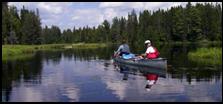 but not. We
were fishing from the Manor’s park! After some hours we had got
four salmon trout and thought it was enough. In the evening we
prepared them together with the cook. Never has a dinner
tasted so good!
but not. We
were fishing from the Manor’s park! After some hours we had got
four salmon trout and thought it was enough. In the evening we
prepared them together with the cook. Never has a dinner
tasted so good!
Next day we decided to be a little cultural so we went to Tidö
Castle, a well-known Mälar castle. Tidö is from the 1600s and
famous in part for its 43 magnificent carved doors with wood inlay
and also for a comprehensive toy museum. We enjoyed a romantic
walk, before dinner, in the Manor’s flower-filled parkland, along
small paths, over small white bridges, and watched carp
swimming in the pond. Our last day we tried horse riding, new for
me but not for Mary. The stables were just five minutes away and an
instructor took care of us and gave us a riding lesson and
then we went out in the countryside in a slow pace. Both
relaxing and exiting! The service at Surahammar was very high, they
suggested excursions and helped us in every possible way.
Stockholm city life: We checked in to our double room at hotel
Terminus, located in the very centre of Stockholm. The hotel
opened in 1909 and is well-known for its traditional
atmosphere and personal service. Near to all that Stockholm
offers of restaurants, theatres, shopping, historic buildings and
other attractions. In the afternoon we enjoyed a walking tour in
the Old Town and visited the Royal Castle. In the night we went to
Spy Bar and mingled with Stockholm’s glitterati! The day
after we took a guided boat tour under the bridges of
Stockholm. And visited the Vasa Museum, a 17th century pride
of the Swedish fleet, resurrected 333 years after sinking and the
nearby Skansen, a zoo and the world’s first open-air museum. In the
evening we just relaxed in one of Stockholm’s open-air cafés
and enjoyed the city nightlife. Before leaving to the airport
we just had a morning of leisure.
If you are interested in spending some time in the Mälar Valley,
contact Eva at Peace and Quiet Travel, a Swedish tour operator,
offering all sorts of packages to the Mälar Valley and combination
Stockholm city and countryside. Eva can be contacted by
e-mail on: info@peaceandquiet.co.uk
or take a look at their website:

 Friday – the shopping trip
to Mtwara took 5 hours whilst Esther searched all over town for
enough chickens to feed this crowd whilst the goat in question was
tethered outside the Boma bleating for a few hours. Saturday –
kitchen a hive of activity chopping, cutting, marinating and
counting bottles of water, soft drinks, plates, glasses, knives,
forks etc. Last minute panic appeared non-existent – my own
memories of the night before a major event of this importance were
very different!
Friday – the shopping trip
to Mtwara took 5 hours whilst Esther searched all over town for
enough chickens to feed this crowd whilst the goat in question was
tethered outside the Boma bleating for a few hours. Saturday –
kitchen a hive of activity chopping, cutting, marinating and
counting bottles of water, soft drinks, plates, glasses, knives,
forks etc. Last minute panic appeared non-existent – my own
memories of the night before a major event of this importance were
very different!
 The official party arrived in a flurry of dust as about 40 cars
swept into the school ground. In the background was the celebratory
sound of drums and chanting, and there were dancers that we could
hear but not see from our corner of the school ground. Because they
were so late we abandoned all attempts at ‘silver service’ and put
a couple of desks in the centre of the room as a buffet and allowed
them to help themselves. We were advised to do this so that we
could not be held responsible for delaying them and influencing how
long they took to eat!
The official party arrived in a flurry of dust as about 40 cars
swept into the school ground. In the background was the celebratory
sound of drums and chanting, and there were dancers that we could
hear but not see from our corner of the school ground. Because they
were so late we abandoned all attempts at ‘silver service’ and put
a couple of desks in the centre of the room as a buffet and allowed
them to help themselves. We were advised to do this so that we
could not be held responsible for delaying them and influencing how
long they took to eat!
 After they had eaten the
District Commissioner invited the whole Boma team into the room,
introduced us and gave a short speech of thanks for providing such
a wonderful lunch. He acknowledged that the Boma is run by Trade
Aid and proceeded to thank Trade Aid for providing this opportunity
for employment and the development of tourism in the Mtwara Region.
The Prime Minister's photographer recorded the event and held a
photo shoot taking a number of pictures on the Trade Aid digital
camera.
After they had eaten the
District Commissioner invited the whole Boma team into the room,
introduced us and gave a short speech of thanks for providing such
a wonderful lunch. He acknowledged that the Boma is run by Trade
Aid and proceeded to thank Trade Aid for providing this opportunity
for employment and the development of tourism in the Mtwara Region.
The Prime Minister's photographer recorded the event and held a
photo shoot taking a number of pictures on the Trade Aid digital
camera.
 After picking up
our rental car at the airport and after some looking on the map we
found Surahammar Manor. A fantastic place in the Mälar Valley with
romantic surroundings! And such a family atmosphere! The owners
themselves welcomed us and we got a high standard room facing the
parkland. All rooms are individually decorated with elegant
antique furniture. And we really enjoyed the welcome dinner with
Swedish schnapps. In the evening we went early to bed, talked about
our wedding and revelled in that pleasant tired feeling in your
body and serenity in your heart that only a great day can
bring!
After picking up
our rental car at the airport and after some looking on the map we
found Surahammar Manor. A fantastic place in the Mälar Valley with
romantic surroundings! And such a family atmosphere! The owners
themselves welcomed us and we got a high standard room facing the
parkland. All rooms are individually decorated with elegant
antique furniture. And we really enjoyed the welcome dinner with
Swedish schnapps. In the evening we went early to bed, talked about
our wedding and revelled in that pleasant tired feeling in your
body and serenity in your heart that only a great day can
bring!
 but not. We
were fishing from the Manor’s park! After some hours we had got
four salmon trout and thought it was enough. In the evening we
prepared them together with the cook. Never has a dinner
tasted so good!
but not. We
were fishing from the Manor’s park! After some hours we had got
four salmon trout and thought it was enough. In the evening we
prepared them together with the cook. Never has a dinner
tasted so good!